最新仁爱版英语八年级下册Unit5知识点归纳复习
仁爱版八年级英语下册Unit-5 topic 1 重点知识点总结
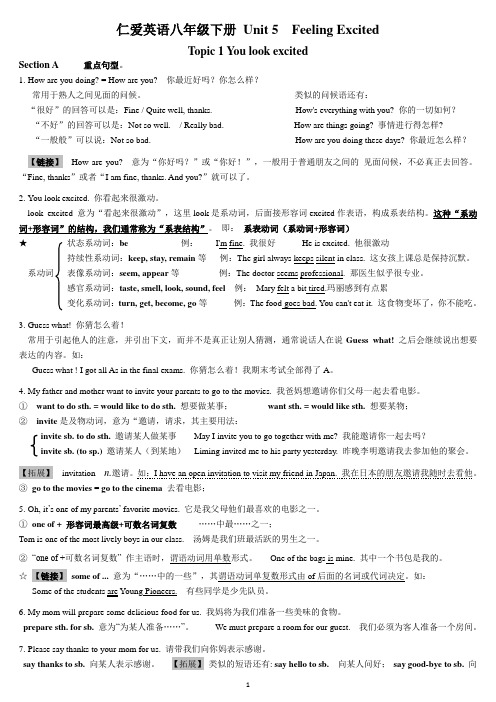
仁爱英语八年级下册Unit 5 Feeling ExcitedTopic 1 You look excitedSection A 重点句型。
1.How are you doing? = How are you? 你最近好吗?你怎么样?常用于熟人之间见面的问候。
类似的问候语还有:“很好”的回答可以是:Fine / Quite well, thanks. How's everything with you? 你的一切如何?“不好”的回答可以是:Not so well. / Really bad. How are things going? 事情进行得怎样?“一般般”可以说:Not so bad. How are you doing these days? 你最近怎么样?【链接】How are you? 意为“你好吗?”或“你好!”,一般用于普通朋友之间的见面问候,不必真正去回答。
“Fine, thanks”或者“I am fine, thanks. And you?”就可以了。
2.You look excited. 你看起来很激动。
look excited 意为“看起来很激动”,这里look是系动词,后面接形容词excited作表语,构成系表结构。
这种“系动词+形容词”的结构,我们通常称为“系表结构”。
即:系表动词(系动词+形容词)★状态系动词:be 例:I'm fine. 我很好He is excited. 他很激动持续性系动词:keep, stay, remain等例:The girl always keeps silent in class. 这女孩上课总是保持沉默。
系动词表像系动词:seem, appear等例:The doctor seems professional. 那医生似乎很专业。
感官系动词:taste, smell, look, sound, feel 例:Mary felt a bit tired.玛丽感到有点累变化系动词:turn, get, become, go等例:The food goes bad. You can't eat it. 这食物变坏了,你不能吃。
仁爱版本英语初中八年级下册的Unit5topic1学习知识点学习归纳

one既可指人也可指物,常示意必定范围,所以往常与表范围的of 短语连用;而noone(=nobody)只好指人,不可以与of短语连用。
如:Noneofthat moneyonthe tableismine.桌上没有一分钱是我的。
Noneof usenjoy gettingupearly.我们中间没人喜爱早起。
No one(=Nobody)knowsaboutit. 没有人认识此事。
差别2none与数目相关,可回答howmany,表示“一个也没有”;而noone表示“什么人也没有”,可回答who。
如:-Howmanypeoplearethere inthatroom-None.那个房间里有几个人一个人也没有。
-Whowaslate today-Noone.今日谁迟到了谁也没有迟到。
八年级下册英语笔录:Unit5topic1 SectionAwell (形容)指身体好excited系表构what!猜猜看~!sb.todosth.邀某人去做某事of+最高+名复数theevening夜spend度(周末/假期)sth.forsb.=bereadyfor10⋯准1.smile浅笑名/smiling浅笑的形容2.wechildren同位3.Ifeeldisappointed.(系表构)我感觉绝望。
5.helpothers帮助别人6.bepopularwiththepeople/thepoor在⋯中受迎8.thepoor人therich富人SectionB1. What’sthematterwithsb.=What’swrong withsb.=What ’sthetrouble=What ’sup你怎么了2. getaticketto+影名thekeytothedoor的匙theanswertothequestion的答案wanttodosth.想做某事4.Ihopetodosth./that+句子我希望⋯5.not⋯atall一点也不6.like⋯alot/verymuch很喜oncemore再来一次8.move移人+moved形容感的事+moving动人的3a1.setthetable放餐具set—set(去)/setting(在分)2.beabletodosth.能做某事3.haveafever=haveatemperaturecall的用法givesb.acall 某人一个callsb.=phonesb.=ring 某人打hopeeverythinggoeswell.我希望全部会好起来。
仁爱版英语八年级下 Unit 5 Topic 1 单元知识点复习
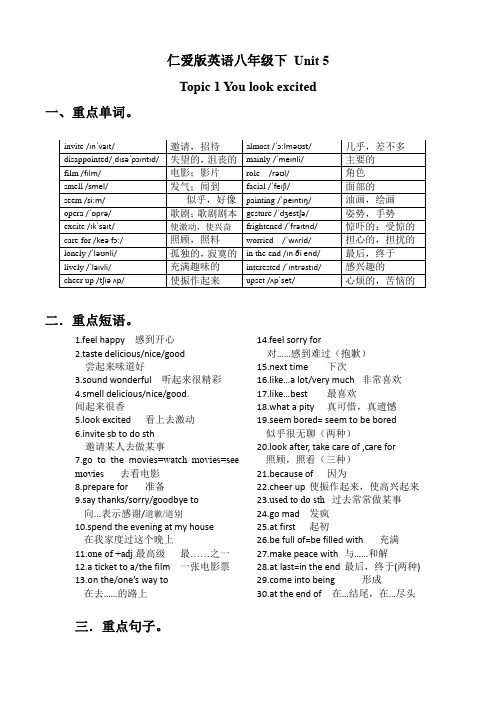
仁爱版英语八年级下Unit 5Topic 1 You look excited 一、重点单词。
二.重点短语。
1.feel happy 感到开心2.taste delicious/nice/good尝起来味道好3.sound wonderful 听起来很精彩4.smell delicious/nice/good.闻起来很香5.look excited 看上去激动6.invite sb to do sth邀请某人去做某事7.go to the movies=watch movies=see movies去看电影8.prepare for准备9.say thanks/sorry/goodbye to 向...表示感谢/道歉/道别10.spend the evening at my house在我家度过这个晚上11.one of +adj最高级最……之一12.a ticket to a/the film一张电影票13.on the/one’s way to在去……的路上14.feel sorry for对……感到难过(抱歉)15.next time下次16.like…a lot/very much非常喜欢17.like…best最喜欢18.what a pity真可惜,真遗憾19.seem bored= seem to be bored似乎很无聊(两种)20.look after, take care of ,care for照顾,照看(三种)21.because of因为22.cheer up使振作起来,使高兴起来ed to do sth过去常常做某事24.go mad发疯25.at first起初26.be full of=be filled with 充满27.make peace with与……和解28.at last=in the end最后,终于(两种)e into being形成30.at the end of在…结尾,在…尽头三.重点句子。
最新版仁爱 英语八年级下unit 5-6知识点整合

Unit 5 Feeling ExcitedTopic 1 I am so happy• 1 You look excited.•连系动词(look)+ 形容词(excited)的结构,系表结构。
•1)表示状态的连系动词•be•look•sound•taste•smell•feel•seem•keep•stay•2) 表示转变或结果的连系动词•get•turn•go•become•grow•When she saw this, her face turned red.•The weather is getting warm.•Children grow wiser as they grow.•The food goes bad. You can’t eat it.• 2. My father and mother want to invite your parents to go to the movie.•Invite sb. to somewhere•I invite you to my home.•Invite sb. to do sth.•I invite you to go shopping.• 3. Oh, it is one of my favorite movies.•One of “…之一”•She is one of the beautiful girls in our class.•One of them is from America.•Some of “…中的一些”•Some of the students fail the exam.•Some of the food goes bad.• 4. Please say thanks to your mom.•Say hello to sb.•Say goodbye to sb.•Say sorry to sb.•5….because he was not able to buy a ticket to The Sound of Music.•the key to the door•the answer to the question•the way to the station• 6. What a pity!•主要向对方表示遗憾•That’s too bad!•It’s a great pity!•What a shame!• 1. He seems a little unhappy.•Seem + adj.•You seem happy.•Seem + n.•He seems a nice man.•Seem + to do sth./ seem + that 宾语从句•They seem to know everything. = It seems that they know everything. •Seem/ look•Seem 具有强烈的真实性,是根据某种判断而得出的印象或看法。
仁爱版八年级下册英语-Unit 5:Topic 2单词汇总+知识梳理(word版)
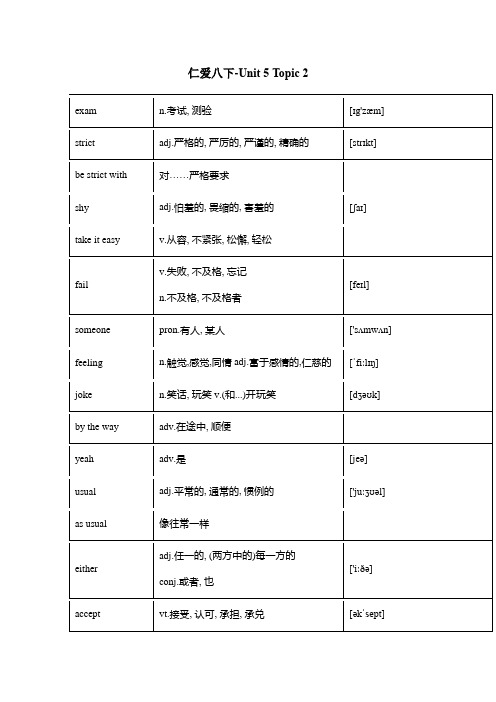
仁爱八下-Unit5Topic2【重点短语】1.do badly in=be bad at在某方面做的差2.be strict with sb.对某人要求严格3.have a talk with sb.与某人交谈4.be worried about=worry about担心5.take it easy放松点,别紧张6.fail the Englishexam英语考试不及格7.fail todos th.失败做某事8.at one sage在某人这个年龄时9.tell jokes讲笑话10.sb.find/thinkit+adj.todosth.某人认为/发现做某事是11.be kind/friendly to sb对某人友好12.wish todos th./hope todos th.希望做某事wish sb.todos th.希望某人做某事13.what's more而且14.that替代前面所提到可数名词单数或不可数名词those替代前面所提到可数名词的复数15.be afraid of doing sth.be afraid todos th.害怕做某事16.as+adj/adv.原级+as和.....一样not as/so...as(as...as否定形式)17.make faces做鬼脸18.refuse todos th.拒绝做某事19.deal withdo with处理,解决20.goto the movies去看电影21.no longer=not...any longer不再22.though/eventhough虽然,尽管(不能和but连用,但可与still,yet连用) 23.be/getusedtodoingsth.习惯于做某事used to so sth.习惯于做某事【词形变化】1.sad adj.sadlyadv,sadnessn2.almost/nearly adv.几乎,差不多3.fair adj..公平的unfair adj,不公平的ev./n使用/用途useful adj.有用的useless adj.无用的ual adj.通常的,平常的usually adv.通常6.love v.爱,热爱lovely adj.可爱的7.help v.帮助helpful adj.有用的,有益的【重点句型】1.1'm sorry/glad to hear that.听到这我很难过/高兴。
仁爱英语八年级下unit5知识点归纳
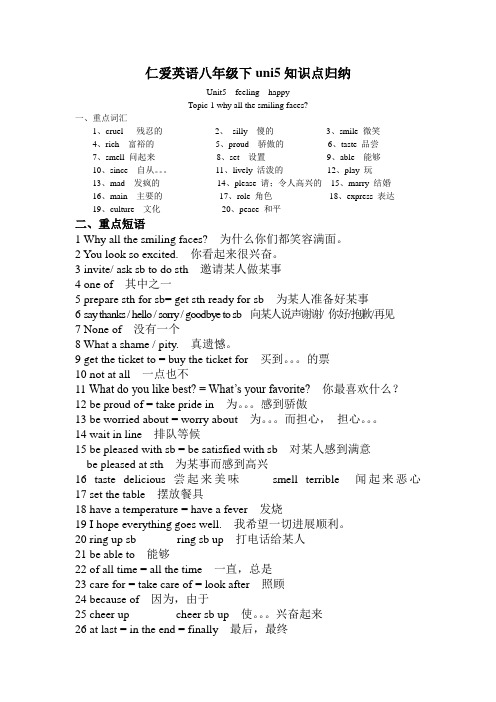
仁爱英语八年级下uni5知识点归纳Unit5 feeling happyTopic 1 why all the smiling faces?一、重点词汇1、cruel 残忍的2、silly 傻的3、smile 微笑4、rich 富裕的5、proud 骄傲的6、taste 品尝7、smell 问起来8、set 设置9、able 能够10、since 自从。
11、lively 活泼的12、play 玩13、mad 发疯的14、please 请;令人高兴的15、marry 结婚16、main 主要的17、role 角色18、express 表达19、culture 文化20、peace 和平二、重点短语1 Why all the smiling faces? 为什么你们都笑容满面。
2 You look so excited. 你看起来很兴奋。
3 invite/ ask sb to do sth 邀请某人做某事4 one of 其中之一5 prepare sth for sb= get sth ready for sb 为某人准备好某事6 say thanks / hello / sorry / goodbye to sb 向某人说声谢谢/ 你好/抱歉/再见7 None of 没有一个8 What a shame / pity. 真遗憾。
9 get the ticket to = buy the ticket for 买到。
的票10 not at all 一点也不11 What do you like best? = What’s your favorite?你最喜欢什么?12 be proud of = take pride in 为。
感到骄傲13 be worried about = worry about 为。
而担心,担心。
14 wait in line 排队等候15 be pleased with sb = be satisfied with sb 对某人感到满意be pleased at sth 为某事而感到高兴16 taste delicious 尝起来美味smell terrible 闻起来恶心17 set the table 摆放餐具18 have a temperature = have a fever 发烧19 I hope everything goes well. 我希望一切进展顺利。
仁爱英语八年级下册Unit5词组知识点短语大全(新版)

Unit 5 Topic 1短语1.Guess what! 你猜怎么着!2.invite sb. to do sth. 邀请某人做某事3.go to the movies 去看电影4.one of +名词复数…之一5.spend…(in) doing花费时间做某事6.prepare sth. for sb. 为某人准备某物7.say thanks to 向…道谢8. a ticket to… 一张…票/入场卷9.on one’s way to…在去…的路上10.be able to do 能够做某事11.What a pity! 多可惜啊!12.It seems that+从句似乎…13.seem to do 似乎做某事14.next time 下次15.care for = take care of 照顾,照看16.because of 因为,由于17.teach sb. to do 教某人做某事18.cheer up 使振作起来,使高兴起来19.at first 最初,一开始e into being 形成,出现21.why not do sth. = why don’t you do为什么不做某事22.agree with sb. 同意某人23.be popular with sb. 对某人来说流行24.be afraid of doing sth. 害怕做某事25.in the end 最后,终于26.at the end of…在…的最后27.have a history of+数字有...久的历史28.be full of 充满,装满29.be famous for 因为…而出名30.make peace with sb. 与某人和解31.be interested in…对…感兴趣32.be worried about…担心…Unit 5 Topic 2短语1.do badly in (doing) sth. 在某事上做的不好2.be strict with sb. 对某人严格3.have a talk with sb. = talk with sb. 和某人谈话4.send sth. to sb. = send sb. sth. 发送给某人某物5.Take it easy. 放松,别紧张6.fail the exam 考试不及格7.at your age 在你这个年龄8.at the age of 在…岁的时候9.make friends with sb. 和某人交朋友10.by the way 顺便说11.help sb. with sth. 在某方面帮助某人12.at that time 在那时13.What’s more 此外14.A as adj./adv. as B A和B一样…15.not so/as adj./adv. as A不如B…16.with the help of sb. = with one’s help在…的帮助下17.be afraid to do = be afraid of doing 害怕做某事18.make faces 做鬼脸19.deal with(常用how连用) 处理,解决20.do with(常用what连用) 处理,解决21.refuse to do 拒绝做某事22.all the time 一直,总是23.learn … from sb. 向某人学习…24.go mad = get mad 发疯,变疯25.instead of (doing) sth. 代替(做)某事26.no longer = not … any longer 不再…27.even though = even if 即使,尽管28.be angry with sb. 和某人生气29.ask sb. for help 向某人求助30.let/make/have sb. do sth. 让某人做某事31.know about sth. 了解某事32.be/get used to doing sth. 习惯于做某事Unit 5 Topic 3短语1.get nervous 变得紧张2.because of…因为,由于…(接单词或短语)3.give a speech 做演讲4.practice doing 练习做某事5.take/follow one’s advice/suggestion听从某人的建议6.in public 在公共场合7.Why not do sth. = Why don’t you do sth.为什么不做某事(表建议)8.fall off…从…摔下,从…掉下9.What/How about doing sth.做某事怎么样?(表建议)10.give sb. a surprise 给某人一个惊喜11.put on 上演,演出;穿上12.at the English Corner 在英语角13.be confident about…对…感到自信14.in a good/bad mood 处于好的/坏的情绪15.affect one’s feelings 影响某人的感觉16.all the time 总是,一直17.be proud of…对…感到骄傲18.get ready for = prepare for 为…作准备19.get together with sb. 和某人团聚20.fill with (使)充满,填满,装满21.have trouble/difficulty (in) doing做某事有麻烦/困难22.cheer sb. up 使某人振作起来23.calm down 冷静下来e to sb. 突然进入脑海,突然呈现25.be crowded with 挤满,满是26.keep silent 保持沉默27.get help from…从…得到帮助28.make a decision 做决定29.think over 仔细考虑30.get back to 重新回到,恢复31.a sense of happiness 幸福感32.be in trouble 有麻烦,处于困境。
仁爱版英语八年级下册Unit5知识点总结

仁爱版英语八年级下册Unit5知识点总结Unit 5 Feeling ExcitedTopic 1 You look excited一.重点句型。
Section A1.How are you doing? =How are you? 多用于熟人之间的问候。
2.My father and mother want to invite your parents to go to the movies.1)A. want to do sth. = would like to do sth.B. want sth. = would like sth.2)invite sb. to do sth. invite sb. (to sp.) 邀请某人(到某地);Liming invited me to his party yesterday.3)go to the movies 去看电影;3. It’s one of my parents’favorite mo vies.1)one of + 形容词最高级+可数名词复数....中最....之一;Tom is one of the most lively boys in our class. 汤姆是我们班最活跃的男生之一。
2)“one of +可数名词复数”作主语时,谓语动词用单数形式。
One of the bags is mine.4.My mom will prepare some delicious food for us.prepare; prepare for; prepare…for; be prepared for; prepare to do sth. 的区别:A.prepare sth.意为“准备某事”强调准备的过程或动作。
Our English teacher was preparing the lessons when I came into the office.我进办公室时,我们的英语老师在备课。
仁爱版英语八年级下册知识点梳理
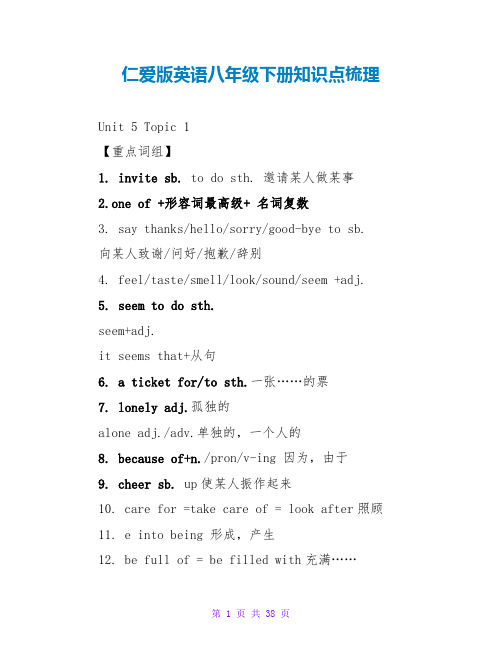
仁爱版英语八年级下册知识点梳理Unit 5 Topic 1【重点词组】1. invite sb. to do sth. 邀请某人做某事2.one of +形容词最高级+ 名词复数3. say thanks/hello/sorry/good-bye to sb. 向某人致谢/问好/抱歉/辞别4. feel/taste/smell/look/sound/seem +adj.5. seem to do sth.seem+adj.it seems that+从句6. a ticket for/to sth.一张……的票7. lonely adj.孤独的alone adj./adv.单独的,一个人的8. because of+n./pron/v-ing 因为,由于9. cheer sb. up使某人振作起来10. care for =take care of = look after照顾11. e into being 形成,产生12. be full of = be filled with充满……13. agree with sb.同意某人14. make peace with sb.与某人和平相处16. be popular with sb.受某人欢送【词形变化】1.invite v.邀请invitation n.邀请2.disappionted adj.绝望的,沮丧的disappointment n.绝望,沮丧disappoint v.使绝望3.excite v.使冲动,使兴奋excited adj.兴奋的,冲动的(修饰人)exciting adj.令人兴奋的,使人冲动的(修饰物) 4.main adj.主要的mainly adv.主要地5.face n.脸,面部facial adj.面部的6.worry v.担忧worried adj.担忧的,担忧的【重点句型】1.--How are you doing?你好吗?--Very well.非常好。
[原创归纳]仁爱版八年级下英语语法归纳
![[原创归纳]仁爱版八年级下英语语法归纳](https://img.taocdn.com/s3/m/8d95b6f58ad63186bceb19e8b8f67c1cfad6eed0.png)
初二年下册英语语法归纳(仁爱版)【2】Unit5Topic1SectionA2.1nvitesb./todosth.邀请或人做某事;Invitesb.\+地点邀请或人去某地.3.Prepare...for...=getreadyfor...为预备.4.Saythankstosb.向或人道谢. SectionBl.Aticketto\for的票.2.Beabletodosth...=can有才能做某事.但是can一般用于如今时和曩昔时而beableto可以用于任何时态・3................................................................................ Ringsb.up打德律风给或人.4.Beproudof以自满.5.Bepleasedwith.对..满足.SectionC1.Careabout关怀;Care+从句省略about2.Getmarriedtosb.=marrysb.与或人娶亲.3.关于消费:Sth.Costsb.+钱;Sb.spend+时\钱in.onsth.'doingsth.Ittakesb\时todosth.;Sb.pay钱forsth.4.Beon上映.5.Cheerup使振作.6.What...for=why.(白话)SectionDeintobeing形成.2.Befullof=befilledwith充满.3.......................... Endwith以结尾.4.Makepeacewithsb.与或人媾和.Unit5Topic2SectionA1.Seem/todosth.似乎做某事.\adj作表语.;Itseemthat+从句.2.Havetalkwithsb.与或人攀谈.3.Bestrictwithsb.对或人严厉.SectionBl.Failtodosth.掉败,做不到某事.2.Atone'sage.在年纪时3.Attheageof.在岁时4.Makesb.todosth让或人做某事.As+adj\adv原级+as与一样;Notas\so+adj\adv原级+as与不一样.6.Be\getusedtodoingsth.习惯做某事;Usedtodosth.曩昔习惯做某事.SectionC 1.Beafraidofdoingsth.畏惧做某事.2.Dealwith=dowith.处理.4.Refusetodosth.谢绝做某事.5.Eventhough=even讦即使.6.Not...anylonger=nolonger不再.7.Fallasleep入睡.8.Inone'steens在或人的时期.9.Give.ahand=dosb.afavor=helpsb.给或人关心.10.比较级+and+比较级越来越程度递增.The+比较级...The+比较级…越越两种情形同时变.11.原因状语从句.Unit5Topic3SectionA1.Have\has+动词曩昔分词.如今完成时.2.Can'tbe确定不是,否认推想.3.Mustbe必定是,确定推想.4.Maybe可能是,猜测推想.5.Attheendof...在…的最后;Intheendof...最后.6・That\it's+adj+foi\tobdosth.7.1nsteadof+n.\v\代…代替8.Taketurnstodosth.=taketurnsatdoingsth.=dobyturns轮流做某事.SectionB 1......................................... B ebad\good for...对有害\益.2661alongwithsb\sth与相处得好.3.Justas似乎.4.Smileat\tosb.\sth.微笑面临或人.某事;Smile,微笑(没有声音);Laugh,大笑(有声音),Laughatsb.取笑或人.5.Giveasurprisetosb=givesbasurprise给或人一个惊喜.6.0ntheone'swayto...在或人去的路上;后接副词则省去to.SectionC1.世界上举世无双的事物前加定冠词the2.Hadbetterdosth\notdosth.最好做某事.不要做某事.SectionD1.Getbacktosth持续回到某事上.Unit6topic1l.Goonavisitto...去旅游.参不雅.2.1t'shatetosay这很难说.3.Decidetodosth决议做某事.4.Make(take)adecide下决议.5.Decideon\upon决议.SectionBl.Ticketat+钱+for...票的价钱.2・具体某一天的早・中・晚上,前用介词on・SectionCeupwith…想出.2.Lookforwardtosth\doingsth.愿望某事.愿望做某事.3.Hearfromsb收到或人来信.SectionD动词不定式1•根本情势:to+动词本相(确定情势)Notto+动词本相(否认情势)2・特点:没有人称和数的变化・3・常用句型:It's+adj+todosth.Too+adj+todosth・4・动词不定式可以跟疑问词连用・E.g:Idon'tknowwhattodo\howtodoit.Unit6topic2SectionA1.Plantodosth.筹划做某事.2.Makeaplanto...\makeplansto...制订的筹戈U.SectionB1.Atthefoot of...在的脚下.2.Marksthebeginningof标志着的开端.3.Bytheway.趁便问一下.4.Onbothsides of...在的两旁.5.“几个半”表示办法:基数词+and+ahalf+n.=基数词+n.+and+ahalf.E.g.oneandahalfyears=oneyearandahalf.一年半.6.表示方位的介词差别Inthe+方位名词+of・・・指某一规模内的地区.(中国,北京)tothe+方位名词+of・・・指互不交界互不管辖的地区.(中国,日本)onthe+方位名词+of・互相交界但互不管辖的地区.(中国,尼泊尔)SectionCl.Outofsight看不见(视线之外)2.Noticesbdo\doingsth.留意或人(正在做)做某事.3.Can'thelpdoing不由得.4.Arrivein+大地点;Arriveon+小地点SectionD1.Havefundoingsth.从做某事中得到乐趣.2.时光状语从句特点:常用一般如今时表示未来时;主句未来时,从句用一般如今时;时态一致——主句与从句同时为曩昔时.引诱时光状语从属连词:When(当的时刻,强调统一时光或一前一后)while(当的时刻,带有延续性)before(在之前)after(在之后)as(当的时刻)until.till(直至U为止)assoonas (一就)Unit6topic3SectionAl.Beafraidofdoingsth.\that+从句.畏惧做某事.SectionB1.Warnsbtodosth\nottodosth.警告.提示或人做某事.不做某事.2.Warnsbaboutsth提示或人某事.SectionC1.Goondoingsth持续做某事(统一件);Goontodosth.持续做某事(另一件)2.Make\letsbdosth使或人做某事.3.使役动词makelethave等,一律省去to,直接加动词本相.SectionD前提状语从句:1•由if,uness(除非)引诱的状语从句叫前提状语从句.2.特点:常用一般如今时表示未来时;主句未来时,从句用一般如今时.主句含一般未来时.祈使句•情态动词,从句用一般如今时.Unit7topic1SectionA1.Turnto=asksb.forhelp向或人乞助.2.Knowabout懂得.3.Chatwithsb.ontheinternet和或人在网上谈天.4.Tryone'sbest\doone'sbest尽或人最大尽力.5./Thinkover细心斟酌\Thinkof斟酌,对有意见.此时可与thinkabout交换.6.Imaginedoingsth.想象做某事.SectionB1.Haveasweettooth爱吃甜食.2.What'smore并且.SectionCl.Inorderto do...为了做;Inorderthat+从句引诱目标状语从句.2.Keepupsth.保持做……3.Seed+间接宾语(sb.)+直接宾语(sth.)双宾构造句.4.Givesb.bes twishesto.或人最好的祝贺给...What引诱的感慨句,强调名词,单数可数名词前带冠词a\an・有时主语和谓语可以省去.SectionDetrue系表构造.成为实际.2.Invitation邀请函.3•宾语从句IUnit7topic2SectionA1.Beglad+adj.+that从句.愉快……2.Cutsth.切某物;Cutup切碎;Cutsth.Into...切成;Cutdown砍到.3.Addto添加;Add...to…将加在…;Addup加起来;Addupto总计为4.表次序词:(含序数词)First起首.Second其次next在此then然后.Afterthat然后finally最后. SectionBl.Spreadsthonsth.往上面抹2.Practicemakesperfect熟能生巧. SectionCl.Startwith以……开端.2.Eatsth.up吃完,吃光.3.Finishdoingsth.完成做某事.4.Pickup捡起,捡起.SectionD1.Atthesametime同时.2•宾语从句IIf\whether引诱的宾语从句,不能省略引诱词可以与whether通用,但在whether ・・・or not的情形下则不能.Unit7topic3SectionAl.Forsale待售;0nsale出售.2.Besatisfiedwith...对满足.3.Wishsb.sth.祝贺或人;Wishtodosth=Hopetodosth.愿望做某事.Wishsb.todosth.愿望或人做某事.4.Hope斟酌可能性的“愿望”;Wish不斟酌是否可能.SectionBl.Ordersbtodosth敕令或人做或人;Orderthat+从句.SectionCl.Beworthdoingsth.值得做某事.SectionD1.1t'ssaid...据说后接that引诱从句.2.1nshort总之.3.Notonly.butalso.不但..并且..衔接的并列成分必须雷同,当衔接两个名词或代词为主语.谓语动词单复数采用就近原则,保持一致.4.Notall并非,部分否认.5.It'sbelievedthat...信任6•副词比较级根本用法:副词的比较等级情势与变化与形容词大致雷同,今后缀-ly结尾的比较级和最高等大多在前面加more和most(1)原级・As+adj./adv.原级+as和一样.⑵比较级.Adj./adv.比较级+than比…更…⑶最高等•三者或三者以上比较时,常用the+adj./adv.最高等+in/of・・・(比较规模).副词最高等前可以省略the否认比较级可用less+adj./adv.原级+than.同级比较中第一个as前面用序数词或量词润饰,可表示倍数关系.形容词和副词比较级前用much\alot等润饰,表示不同程度.借助other.else或否认词,比较级情势可用来表示最高等概念.(4)the+比较级,the+比较级表示越越⑸比较级+and+比较级.表示越来越……Unit8Topic1SectionA1.目标状语从句.(同成果状语从句)So・・・that・・・引诱的状语从句.So+adj./adv.+that・...so+adj.+an/a+名词单数+that・・・如斯以至于用于引诱主句导致的成果.Such+n.+that•从句•同样表示如斯以至于.不同:so后面接形容词或副词,such后面接名词.SectionBl.Bemakeof+原料由制成.(看得出原材料)2.Bemakefrom+原料由制成.(看不出原材料)3.Afford(tobuy)sth.买得起.累赘得起SectionCl.Dependon依附.取决于.2.Dependonsb.todosth.dependonsb./sth.3.Thesame as...与一样.4.Nearly差不多.Near邻近.5.Hard尽力地.Hardly几乎不.SectionD1.Protect....from...破坏…不受…的损害.2.Youarewhatyouwear衣如其人. Unit8Topic2SectionA1.Allowsb.todosth.许可或人做某事;Allowdoingsth许可做某事.2.Suitableforsb.todosth.对或人来说合适做某事.3.Stopsb.fromdoingsth.阻拦或人做某事.4.Tocarryouttheplan把筹划付诸行动.5.Atwork在工作,从事于SectionBSectionC...SectionD1.Advise建议.作动词;Advice建议.作名词.2.Artofdressing着装艺术. Unit8Topic3SectionA1.Thereisgoingtobe=therewillbe(初一常识)未来时构造.SectionB1.Askforsb./sth至于,就或人.某事而言.2.Another作形容词,意为又一个,再一个.其构造为:/another+n.单数可数=onemore+n.单数可数.\another+数词+n.复数可数=数词+more+n.复数可数.SectionCl.Getitsname得名.2.Design…as…把设计成3.Either...or...要么要么,不是就是,表选择关系.4.区分that,those,one,ones.That指代上文消失过的不可数名词.Those指代上文消失过的复数名词.One指代上文消失过的可数名词的单数.Ones指代上文消失过的可数名词的复数.SectionDl.Well-known=widelyknown众所周知.2.Atthetime一度,曾经.3.Atatime每一次.用在句末.4.Attimes有时刻.等于sometimes5.Except除了以外.除去部分不包括在内;Besides除了以外,还有除去部分包括在内;But除了......以外,没有......,只有......6•宾语从句皿删除:假如句中含有助动词do\does\did就把其删掉落后面的动词,作出响应的变化.移动:假如句子含有情态动词和be动词,以及否认的助动词,把它们移动到主语后,行动动词前.宾语从句的口诀:进修宾从要留意,时态语序和连词.时态主从要呼应:主句若为如今时,从句时态随句意.主句若为曩昔时,从句时态变曩昔.宾从所示表真谛,时态不变不疑惑.语序要用陈述序,切莫照搬疑问句.That衔接陈述句,省与不省要留意•从句若表“是否”时fwhether要切记.特别问句做宾语,仍用本来疑问词.三个问题要记牢,切莫丢东又往西.。
仁爱版英语八年级下册Unit5知识点归纳
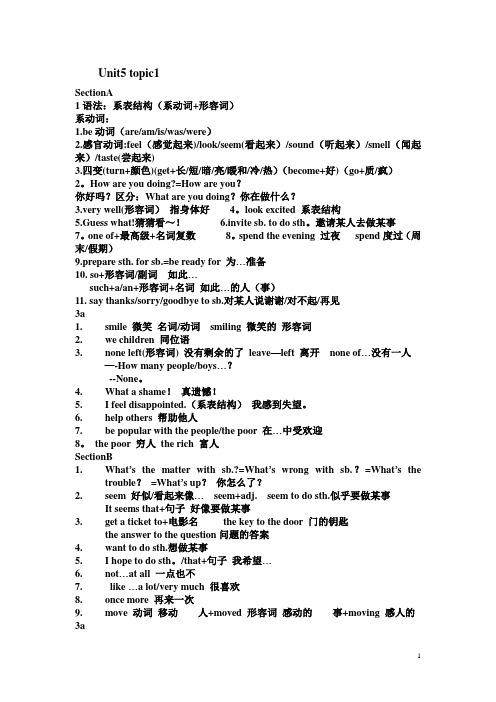
Unit5 topic1SectionA1语法:系表结构(系动词+形容词)系动词:1.be动词(are/am/is/was/were)2.感官动词:feel(感觉起来)/look/seem(看起来)/sound(听起来)/smell(闻起来)/taste(尝起来)3.四变(turn+颜色)(get+长/短/暗/亮/暖和/冷/热)(become+好)(go+质/疯)2。
How are you doing?=How are you?你好吗?区分:What are you doing?你在做什么?3.very well(形容词)指身体好4。
look excited 系表结构5.Guess what!猜猜看~!6.invite sb. to do sth。
邀请某人去做某事7。
one of+最高级+名词复数8。
spend the evening 过夜spend度过(周末/假期)9.prepare sth. for sb.=be ready for 为…准备10. so+形容词/副词如此…such+a/an+形容词+名词如此…的人(事)11. say thanks/sorry/goodbye to sb.对某人说谢谢/对不起/再见3a1.smile 微笑名词/动词smiling 微笑的形容词2.we children 同位语3.none left(形容词) 没有剩余的了leave—left 离开none of…没有一人—-How many people/boys…?--None。
4.What a shame!真遗憾!5.I feel disappointed.(系表结构)我感到失望。
6.help others 帮助他人7.be popular with the people/the poor 在…中受欢迎8。
the poor 穷人the rich 富人SectionB1.What’s the matter with sb.?=What’s wrong with sb.?=What’s thetrouble?=What’s up?你怎么了?2.seem 好似/看起来像…seem+adj. seem to do sth.似乎要做某事It seems that+句子好像要做某事3.get a ticket to+电影名the key to the door 门的钥匙the answer to the question问题的答案4.want to do sth.想做某事5.I hope to do sth。
仁爱科普版英语八年级下册Unit5-8重点词组短语归纳

新版仁爱英语八年级下册重点词组集Unit 5 Topic 1invite sb. to do sth. 邀请某人做某事go to the movies = go to the cinema 去看电影on the / one’s way to …在去…的路上say thanks to sb. 向…道谢a ticket to / for…一张…的票seem + adj. / to do sth. 似乎、好像…care for = look after / take care of 照顾feel lonely 感到孤独live alone 独居because of…因为…teach sb. to do sth. 教某人做某事cheer sb. up 使某人振作起来at first 开始、首先come into being 形成、成立over = more than 超过、多于be full of…= be filled with…充满,装满…agree with sb. 同意某人的观点each other 彼此、互相find a way to do sth. 找到做某事的方法make peace with sb. 与某人和解become interested in…对…感兴趣in the end 最后be / become popular with…受…欢迎Topic 2anything wrong 有任何问题(不定代词+形容词)do well / badly in…在…方面做得好/不好take it easy 别紧张,放松be strict with sb. 对某人要求严格be strict in / about sth. 对某事要求严格have a talk with sb. = talk with sb. 和某人交谈be worried about…为…感到担心fail (in) the English exam 英语考试不及格at one’s age 在某人的年龄tell jokes 讲笑话make sb. do sth. 使某人做某事make friends with sb. 与某人交朋友seem to do sth. 似乎要做某事by the way 顺便说(问)一下find it + adj. + to do sth. 发现做某事…help sb. with sth. = help sb. (to) do sth.帮助某人做某事at that time 在那时what’s more 而且as… as…和…一样not as / so… as……不如…as usual 像往常一样as before 像以前一样be / get used to doing sth. 习惯做某事used to do sth. 过去常常做某事with / without the help of sb.= with/ without one’s help 有/没有某人的帮助下give one’s best wishes to sb.向某人致以最美好的祝愿all the time 一直for example 例如It’s normal to do sth. 做某事是正常的。
仁爱英语八年级下册 UNIT5 知识点汇总
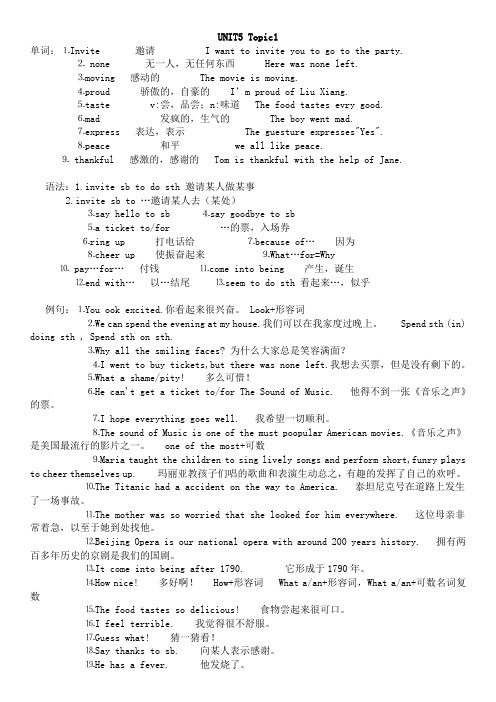
UNIT5 Topic1单词:⒈Invite 邀请 I want to invite you to go to the party.⒉ none 无一人,无任何东西 Here was none left.⒊moving 感动的 The movie is moving.⒋proud 骄傲的,自豪的I’m proud of Liu Xiang.⒌taste v:尝,品尝;n:味道 The food tastes evry good.⒍mad 发疯的,生气的 The boy went mad.⒎express 表达,表示 The guesture expresses"Yes".⒏peace 和平 we all like peace.⒐thankful 感激的,感谢的 Tom is thankful with the help of Jane.语法:1.invite sb to do sth 邀请某人做某事2.invite sb to …邀请某人去(某处)⒊say hello to sb ⒋say goodbye to sb⒌a ticket to/for …的票,入场券⒍ring up 打电话给⒎because of… 因为⒏cheer up 使振奋起来⒐What…for=Why⒑pay…for…付钱⒒come into being 产生,诞生⒓end with…以…结尾⒔seem to do sth 看起来…,似乎例句:⒈You ook excited.你看起来很兴奋。
Look+形容词⒉We can spend the evening at my house.我们可以在我家度过晚上。
Spend sth (in) doing sth , Spend sth on sth.⒊Why all the smiling faces? 为什么大家总是笑容满面?⒋I went to buy tickets,but there was none left.我想去买票,但是没有剩下的。
完整仁爱版八年级英语下册unit5知识点总结

Unit5 Feeling Excited1.How are you doing?=How are you?最近怎么样?2.so+形/副such +a/an+(形) +名(单)3.feel/be sorry for sb.为某人难过4.shout at sb.斥责shout to sb. 对某人大声喊5.agree with sb.同意某人的意见6.one of my favorite movies 我最喜欢的电影之一”:“其中最…之一+N复+V单one of +the +adj.最高级7.过夜spend the evening8.照顾care for = take care of =look after9.问好向某人道谢/道别/say thanks / goodbye/ hello to sb.10.一张…的票 a ticket to…11.做某事(某人)wish (sb.)to do sth. 希望12.做得好;成功do well13.be afraid of doing sth.=be afraid to do sth. 害怕,不敢14. get enough sleep 得到足够的睡眠15. /孤单feel proud/ lonely 感到自豪16. have a test 考试17. give (sb.) a speech=give speeches 做演讲,作报告18. be able to do sth. 有能力做某事19. care for= look after/ take care of 照顾20. cheer sb up使……振奋、高兴起来21. at first 首先22. go mad 发疯23. /身体状况get = become +心情24. be confident about sb. 对某人有信心25.?做某事怎么样?what about doing sth.26.形成come into being27.尤其: 从句especially+单词/短语/28.装满,充满容器+be full of+物=be filledwithThe cup is full of/filled with water.29.fill with 充满,装满30.fill with ; 用装满31.be popular with…受……喜爱32.end/begin with…以……结尾/开始33.You look so excited. 你看起来很兴奋。
仁爱八年级下册英语unit5知识点

仁爱八年级下册英语unit5知识点本篇文章主要介绍仁爱八年级下册英语unit5的知识点,内容包括语法、词汇、听力等方面,将从以下几个方面进行分析和讲解。
Part 1:语法知识点1. 现在进行时现在进行时表示现在正在进行或发生的动作,常由be动词和动词-ing构成。
例句:I am studying English now.(我现在正在学英语。
)2. 不定式不定式常由to+动词原形构成,可用作主语、表语、宾语等。
例句:To learn English well is my goal.(学好英语是我的目标。
)3. 宾语从句宾语从句是指在主句中作宾语的句子,常由连词that或whether引导。
例句:She said that she would come to the party.(她说她会来参加聚会。
)Part 2:词汇知识点1. 熟词生义“乘坐”可以指“搭乘飞机/火车/车辆”等交通工具,也可以指“登上舞台/上车辆/飞机”等镜头。
2. 词义猜测通过上下文的提示来猜测生词的意思,可以使用前缀、后缀、词根等方法进行推测。
例句:The prefix "un-" means "not".(前缀“un-”表示“不”。
)3. 词汇扩展使用词根、前缀、后缀等方法来扩展词汇量,例如添加前缀re-表示“再次/重新”。
例句:He had to reprint the paper.(他不得不重新印刷这篇文章。
)Part 3:听力知识点1. 听写练习通过听力练习来提高听力水平,可以根据单词、短语、句子等不同的难度进行练习。
2. 多听多说通过多听多说来提高语感和口语能力,可以在听歌、看电影或者跟朋友聊天时进行练习。
总结:本篇文章主要介绍了仁爱八年级下册英语unit5的重点知识点,包括语法、词汇、听力等方面。
在学习中,可以通过多种途径来提高自身的英语能力,以达到更好的学习效果。
- 1、下载文档前请自行甄别文档内容的完整性,平台不提供额外的编辑、内容补充、找答案等附加服务。
- 2、"仅部分预览"的文档,不可在线预览部分如存在完整性等问题,可反馈申请退款(可完整预览的文档不适用该条件!)。
- 3、如文档侵犯您的权益,请联系客服反馈,我们会尽快为您处理(人工客服工作时间:9:00-18:30)。
八年级英语(仁爱版)下册语言知识点归纳Unit 5 Feeling Excited Topic 1一. 重点词汇:(一)反义词happy----unhappy/sad lucky----unlucky poor----rich kind----cruelpopular----unpopular smart----stupid/ silly interesting----boring(二)表示情感的形容词excited感到兴奋的 surprised 吃惊的happy 快乐的unhappy/ sad 伤心的angry / mad 生气的worried 焦急的afraid/ frightened 害怕的disappointed 失望的proud 自豪的lonely 孤单的 nervous 紧张不安的interested 感到有趣的(三)重点词组/句型1.one of my favorite movies我最喜欢的电影之一 2.spend the evening 过夜 3.say thanks / goodbye/ hello to sb. 向某人道谢/道别/问好4.a ticket to…一张…的票 5.wish to do sth. 希望做某事 6.get enough sleep 得到足够的睡眠7.win a medal 获得一枚奖牌8.feel proud/ lonely 感到自豪/孤单9.set a table for…为……摆餐具10.have a temperature = have a fever 发烧11.be able to do sth. 有能力做某事12.care for= look after/ take care of 照顾13.because of 由于14.cheer up / cheer on cheer sb up 使…振奋、高兴起来/ 为…喝彩、加油15.be on 上演; 放映16.play the role of sb. 扮演某人的角色17.at first 首先18.fall into 落入19.be afraid of doing sth. 害怕做某事20.in/at the end = at last 最后21.go mad 发疯e into being 形成23.be full of充满=fill…with24.be popular with…受……喜爱25.end/begin with…以……结尾/开始26.Why all the smiling faces? 为什么你们都笑容满面。
27.You look so excited.你看起来很兴奋。
28.prepare sth for sb= get sth ready for sb =be ready for 为…准备为某人准备好某事29.None of 没有一个30.What a shame / pity. 真遗憾。
31.not…at all 一点也不32.What do you like best?= What’s your favorite? 你最喜欢什么?33.be proud of = take pride in 为….感到骄傲34.be worried about = worry about 为….而担心,担心…. 35.wait in line 排队等候 6.be pleased with sb = be satisfied with sb 对某人感到满意37.be pleased at sth 为某事而感到高兴38.taste delicious 尝起来美味39.smell terrible 闻起来恶心40.I hope everything goes well. 我希望一切进展顺利。
41.ring sb up 打电话给某人42.of all time = all the time 一直,总是43.at last = in the end = finally 最后,最终44.tell a story = tell stories 讲故事45.on the / one’s way to 在去往....的路上46.be with a history of 200 years = have a history of 200 years47.( have a ) fight against sb 与某人打架/吵48. the poor穷人the rich 富人49. make peace with sb与某人和解二. 重点语言点1. How nice! 真是太好了! What a shame! 真可惜!=That’s too bad! What bad news! 多糟的消息!这三句全都是感叹句.它们的结构为:1) How + adj./ adv. + 主语+ 谓语! 如: How moving the movie is! How fast the boy runs!2) What + a/an + adj. + n. (可数名词的单数) + 主语+ 谓语! 如: What a big apple (it is)!3) What + adj. + n.(可数名词的复数或不可数名词) + 主语+ 谓语!如: What interesting stories (they are)! What hard work( it is)!2. Because he can’t get a ticket to The Sound of Music. 因为他没有买到《音乐之声》的票.to “的”,常见的搭配如下:a ticket toThe Sound of Music 一张《音乐之声》的票the answer to the question 问题的答案the key to the door 门的钥匙the way to…去….的路3. I think Mr. Lee likes it very much and really wishes to watch it.我认为李老师非常喜欢它而且的确想去看. wish/ hope to do sth.希望做某事hope与wish 都与that引导的从句连用, wish/ hope + that引导的从句;Hope常用于将来时表可能实现的愿望.Wish常用于过去式表示不可能实现的愿望.I hope that you will be happy. I wish that you could be happy. I wish/ hope (that) we will win.我们可以说wish sb. to do sth. 而不能说hope sb. to do sth.;4. I’ll ring up Michael later. 稍后我打电话给迈克.ring up sb. = call/ ring/ phone sb. = give sb. a ring/ call/ telephone = make a telephone to sb.当宾语为代词时, 只能放中间.如: ring me/him/her up5. …since they were not able to go. ……既然他们不能去.表示能力的词.Could 表示过去的能力.Can表示现在的能力be able to可以用于任何时态,表示过去,现在,将来任何时候的能力.将来时态(shall \will be able to--)can与be able to 二者都表“能;会”,在指“一般能力”时,常互换。
如:He can/is able to work out the problem. 他能算出这道难题.区别: can 只有现在式和过去式(could),没有数的变化;而be able to 有时态及数的变化如: I/ She couldn’t swim three years ago, but now I / She can . 三年前,我/她不会游泳, 但现在我/她能.I will be able to see him next week. 下周, 我将会看到他.They were /He was able to climb the mountain, but now they aren’t/ He wasn’t.They’re / He was too old. 他们/他过去能爬得上这座山, 但现在不能. 他们/他太老了.6. I’m sure Mr. Lee will be surprised and happy! 我确信李老师会很惊奇也很高兴!be surprised “感到惊奇的”, 主语一般为人. be surprising “令人惊奇的”, 主语一般为物.动词-ing 和-ed的区别:动词-ing表示主语的特征,常用于事物.动词-ed表示主语的状态,常用于人.这类词有:tired-tiring 疲惫的surprised-surprising 惊喜的moved-moving感动的bored-boring无聊的excited-exciting兴奋的interested-interesting有趣的relaxed-relaxing休闲的等等.For example:The game is interesting. I am interested in the game.7. because of “由于”,是介词短语,后常跟名词或短语。
Because 和so 不能同时使用。
如:He didn’t come to school because of his illness./ because he was ill. 由于他的病,他没来上学。
We didn’t go there because of the heavy rain./ because it rained heavily. 由于大雨,我们没去那儿。
because 引导的原因状语从句: because 用来回答why提问的问句,表示的原因语气很强,一般用在主句后面,强调因果关系.Mr. Wang looks tired because he worked late last night and didn’t get enough sleep.Kangkang is disappointed because his best friend is not able to come.--Why do they feel proud? ----Because a player from their country won a medal.8. Maria was able to cheer up the family by teaching them to sing lively songs…玛丽亚有能力通过教他们唱轻快的歌曲使整个家庭振作起来。
